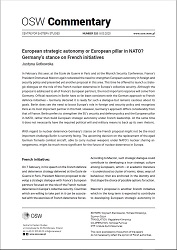European strategic autonomy or European pillar in NATO? Germany’s stance on French initiatives
European strategic autonomy or European pillar in NATO? Germany’s stance on French initiatives
Author(s): Justyna Gotkowska
Subject(s): Security and defense, Military policy, Geopolitics
Published by: OSW Ośrodek Studiów Wschodnich im. Marka Karpia
Keywords: Emmanuel Macron; European autonomy; Europe’s collective security; NATO;
Summary/Abstract: In February this year, at the École de Guerre in Paris and at the Munich Security Conference, France’s President Emmanuel Macron again reiterated the need to strengthen European autonomy in foreign and security policy and presented yet another proposal in this area. This time he offered to launch a strategic dialogue on the role of the French nuclear deterrence in Europe’s collective security. Although the proposal is addressed to all of France’s European partners, the most important response will come from Germany. Official reactions in Berlin have so far been consistent with the German approach to French defence initiatives – Germany declared it is ready for such a dialogue but remains cautious about ist goals. Berlin does see the need to boost Europe’s role in foreign and security policy and recognises Paris as its most important partner in this field. However, Germany’s approach differs considerably from that of France. Berlin prefers to strengthen the EU’s security and defence policy and the European pillar in NATO, rather than build European strategic autonomy under French leadership. At the same time it does not necessarily have the required political will and military means to back up its own rhetoric. || With regard to nuclear deterrence Germany’s stance on the French proposal might not be the most important challenge Berlin is currently facing. The upcoming decision on the replacement of the aged German Tornado combat aircraft, able to carry nuclear weapons under NATO’s nuclear sharing arrangements, might be much more significant for the future of nuclear deterrence in Europe.
Series: OSW Commentary
- Page Count: 5
- Publication Year: 2020
- Language: English
- Content File-PDF

